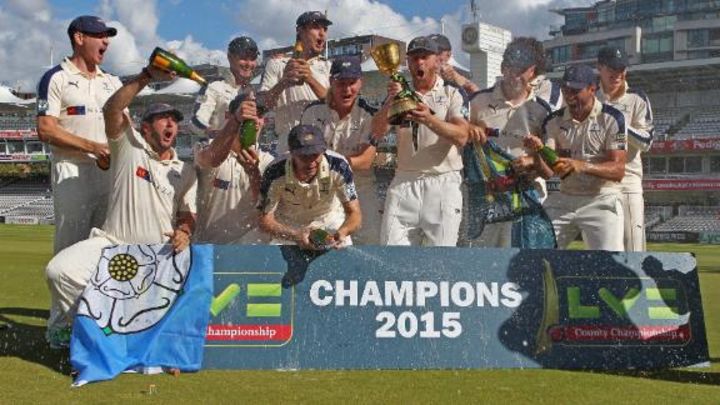Championship to remain 16 games for 2016
The ECB has abandoned attempts to change the domestic structure ahead of the 2016 season
Dobell: Spectators haven't been consulted
Mel Farrell is joined by senior correspondent George Dobell to discuss the news that no changes will be made to the English county season for 2016The ECB has abandoned attempts to change the domestic structure ahead of the 2016 season.
A meeting with county chairmen a couple of weeks ago appeared to have given the green light to plan to reduce the County Championship programme to 14 matches per side and play white-ball cricket in blocks. Senior figures in ECB management hoped to pass the plans at the next board meeting later this month.
But a backlash from county chief executives and members has provoked a rethink. Some chief executives feared that the plans were a precursor to city-based T20 cricket from 2020, while others argued that the integrity of the County Championship would be compromised by an asymmetrical fixture list.
It was also pointed out to the ECB executive that T20 revenues have grown by around 20% this year - at some clubs, such as Yorkshire, they have grown by close to 40% - as the benefit of regular Friday night scheduling takes effect.
So on Wednesday, Tom Harrison, the ECB's chief executive, and Colin Graves, the chairman, wrote to the county chief executives and chairmen to reassure them that there will be further consultation before any change is made.
"There will be no substantial change [in domestic structure] for 2016 and the ECB Board will not be asked to ratify any changes at the next Board meeting," they wrote.
"Constructive, collaborative discussions on the future shape of the domestic cricket season will continue.
"The focus over this autumn and winter will be on establishing a shared vision to help make the best decisions for the long-term and developing a widely accepted schedule for 2017 onwards."
The news may be interpreted as a setback for the ECB management. They have made no secret of their desire to reduce the amount of cricket played and to put more focus on the white-ball game. As recently as last week, a draft schedule was circulated which showed teams playing 14 Championship games per side and their white-ball matches in a block. A few weeks before that, a schedule was drawn-up - and rapidly rejected - suggesting there would be eight teams in the top division and 10 in the bottom from 2016.
The ECB management hoped that Andrew Strauss' presentation to county chairmen had convinced them of the need for more rest and recovery periods in the domestic schedule and the benefits of scheduling formats in blocks.
Strauss argued that change was necessary to enable England to perform better in the 2017 Champions Trophy and the 2019 World Cup, both of which will be staged in the UK. It has now become clear, however, that when those chairmen returned to their counties, they were told in no uncertain terms that the changes were not acceptable to the majority of their members.
It would be wrong to see this as a defining defeat for Harrison and Graves, though. While their plans may be delayed, they will continue to press for change and hope that it can be agreed before the 2017 season. The demand to create more time for rest and recovery will not go away. Nor will the promise of more money for a new city-based T20 league. This is a pause in the battle; not the end of it.
It remains hard to see how agreement can be reached. The culture clash between those who seem to prioritise the revenue possibilities offered by a new T20 league - and the desire to prioritise 50-over cricket - and those who prioritise the County Championship and its role in producing the Test team go to the heart of the global debate about cricket's future.
Equally, while the ECB's constitution enshrines the 18-team first-class system, it is apparent that some within the organisation feel that, at T20 level at least, the optimum number is about half of that.
"We've heard both a desire to look at the long-term interests of the game and an understandable need to have more detail on the impact of any future changes," an ECB spokesman said.
"Clearly, more discussion will be helpful for everyone and these constructive conversations will focus on the long-term strategy as well as the domestic structure, to help us all make the right decisions."
George Dobell is a senior correspondent at ESPNcricinfo
Read in App
Elevate your reading experience on ESPNcricinfo App.
